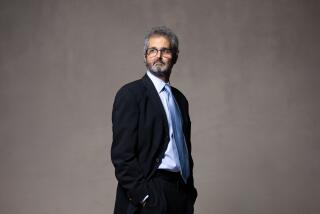Inmate Convicted in Prison Killings Gets Retrial
- Share via
SAN FRANCISCO — A federal judge Wednesday ordered a new trial for the only man convicted of murder in the bloody 1971 San Quentin Prison uprising that left three guards and three inmates dead.
U.S. District Judge Thelton E. Henderson ruled that John L. Spain, one of the so-called San Quentin Six, was denied a fair trial more than a decade ago because he spent much of the trial shackled with 25 pounds of chains.
The chains, ordered by the trial judge because of outbursts by some of the defendants, caused such emotional and physical pain for Spain that he could not defend himself or testify on his own behalf, the judge concluded.
Henderson directed that Spain be retried within 90 days or freed from prison. The state attorney general plans to appeal the ruling and will ask that Spain remain in prison pending the appeal.
“We did it right the first time,” Deputy Atty. Gen. Ronald Nivers said. “Johnny Spain received a fair trial. It is as simple as that. Before we waste the resources of the state on a new trial . . . we should exhaust our appellate remedies.”
Spain’s lawyer, Dennis Riordan, said he will seek the prisoner’s release on bail pending appeal and said Spain could be freed from the California Medical Facility at Vacaville in two to three months.
Spain was convicted on Aug. 12, 1976, of murder in the deaths of two of three guards who were killed. No one was convicted of the remaining murders. Three defendants were acquitted of all charges and two were convicted of assault.
The prison struggle began on Aug. 21, 1971, when George Jackson, a radical inmate at San Quentin and author of the book “Soledad Brother,” pulled a gun on guards after a visit by lawyer Stephen Bingham. Jackson freed inmates in the high security Adjustment Center. Three guards and two inmate trusties were killed by prisoners who stabbed or shot them. As prison guards retook the wing, Jackson ran from the center and was shot and killed.
Bingham fled the country immediately after the riot and remained a fugitive until 1984, when he surrendered. In June, Bingham was acquitted of murder and conspiracy charges stemming from an allegation that he slipped the gun to Jackson.
Spain was convicted of murder, although the prosecution never contended that he stabbed or shot any of the victims. Rather, he was convicted of conspiring with Jackson to escape and was held responsible for two of the deaths that resulted.
After his conviction, Spain pressed his appeal through the state and federal courts, losing rulings before the state Court of Appeal in 1980 and the U.S. Supreme Court in 1983.
Riordan persisted by bringing the appeal back to Henderson, claiming that Spain was denied a fair trial because of the unusually heavy chaining. Henderson, whose opinion was dated Monday but was released Wednesday, agreed and pointed out that the 25 pounds of chains included leg irons, a neck chain, belly chains, handcuffs and a waist chain.
Henderson wrote that Spain was “so preoccupied by the chains that he was unable to cooperate with his attorney during trial.” Spain’s original lawyer, Charles Garry, has said Spain was uncooperative and distrusted him because he was convinced that Garry was not doing enough to persuade the judge to unchain Spain.
“The weight and number of chains used were a punishment in themselves and less restrictive chains would have accomplished the same purpose,” Henderson wrote.
”. . . Despite the pain and humiliation, throughout 203 days of trial, the government points to only three instances in which (Spain) misbehaved in front of the jury. Under the circumstances, it is reasonable to surmise that had (Spain) not been shackled, or shackled with less burdensome restraints, even those three incidents would not have occurred.”
Noting that even minimal shackling suggests to jurors that a defendant is highly dangerous, Henderson said a defendant should be shackled only if it is proved in a hearing that the defendant is so violent that he is a danger to court personnel. The trial judge held no hearing.
“Shackling is a last resort, not the first,” Henderson said, adding that less restrictive means, such as increased numbers of bailiffs, should have been used first.
At the time of the San Quentin riot, Spain was in prison for a 1967 murder in Los Angeles, committed when he was 17. While in prison, he became a radical and a leader in the Black Panther Party. He since has renounced such politics.
Spain has been discipline-free for several years at Vacaville, and has become an electrician. He won unusually wide support from prison guards and officials in a recent bid to win parole.
The Board of Prison Terms denied him a release date in July largely because of the San Quentin conviction.
More to Read
Sign up for Essential California
The most important California stories and recommendations in your inbox every morning.
You may occasionally receive promotional content from the Los Angeles Times.










